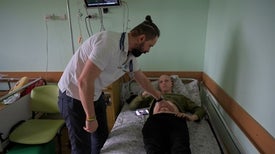What really happens to our bodies when we age—and could we find a way to slow it down?
What if our body could stay in its prime forever? What if we could be biologically immortal like a hydra—a tiny freshwater creature that can continuously renew its cells? Or what if we could turn back the clock like some jellyfish that never die but revert to an earlier form and go through life all over again?
But most cells in our body aren’t built to last a lifetime: they’re damaged all the time by everything from ultraviolet rays to poor nutrition. When this happens, cells make copies of their chromosomes, which contain our DNA, and divide into healthy new cells.
But at some point, cells lose their ability to replicate.
With each cell division the ends of our chromosomes get a bit shorter. These end regions don’t actually hold active genes; they’re protective caps called “telomeres.” But once telomeres shrink past a certain point, the cells can’t divide anymore and enter a state called “senescence.”
There’s nothing inherently bad about cells becoming senescent. Senescent cells just behave differently from cells that can still divide. They also secrete a variety of chemicals that activate the immune system. When we’re young and healthy, this can help us recover from injury, for instance.
The issue is when the body doesn’t eliminate senescent cells quickly enough, and they make neighboring cells go senescent as well. That begins a domino effect that can lead to chronic inflammation. Over time, this makes our brain work slower and causes our body to start to deteriorate. We become more susceptible to disease—and we die.
But does it really have to happen this way?
Experts have lots of theories about why we age. One of the most popular ideas is that human bodies only have a limited amount of lifetime energy, and we spend lots of this energy prioritizing reproductive functions. Scientists call this the “disposable soma theory.” The idea is that our “soma,” or body, is disposable, while our germ line lives on.
Not everyone wants to reproduce, though. For those who would prefer a few extra years to having children, there may be ways to shift your body’s energy allocation, decreasing your fertility to extend your life span.
But if everyone could suddenly choose between fertility and long life, it could lead to a host of ethical issues. Whose lives are extended, and who can reproduce? And if you try to reach a sort of compromise, extending your life span while still having kids, you might just end up increasing your children’s or grandchildren’s risk of mutations, which could end up causing major issues in your descendants.
It’s hard to fight aging because it lies at the core of our genetic makeup.
Short telomeres would be an obvious target for antiaging interventions. But people with very long telomeres—or more telomerase, an enzyme that keeps telomeres long—aren’t always better off. Cancer cells can use telomerase to multiply unchecked. And people with excessively long telomeres may be likelier to get lung cancer and brain tumors.
Some researchers are trying to prevent cells from reaching senescence or to help the body remove senescent cells more efficiently. But they face a similar problem: they need to target specific cells that induce aging, and avoid ones that are benefitting the body.
Researchers still have some ideas for extending life span, though. Among the most popular is moderate caloric restriction. In one study, people who ate 15 percent fewer calories for two years ended up with a significantly lower base metabolic rate, an indicator their body aged less.
But this has to be done very carefully because the body needs nutrients to survive and function properly. And while some caloric restriction may extend life span, scientists are still investigating whether it could lead to unintended side effects. For instance, animal studies suggest undereating may decrease gray matter in the brain, though that doesn’t necessarily mean it hurts mental performance.
Perhaps, though, longer life isn’t the right target. Instead many researchers are turning their attention to giving people more healthy years—something that’s remained a challenge despite medical advances. Chronic diseases are on the rise globally, posing a major strain on health resources and national economies as people live longer.
At this point, there aren’t many innovative ways to extend your so-called health span besides obvious factors such as maintaining a balanced diet, exercise and strong social connections. Beyond that, aging is built into our DNA. And while experts are continuing to explore clever ways to counteract it at a molecular level, through drugs or other therapies, our bodies are never going to be permanent.








